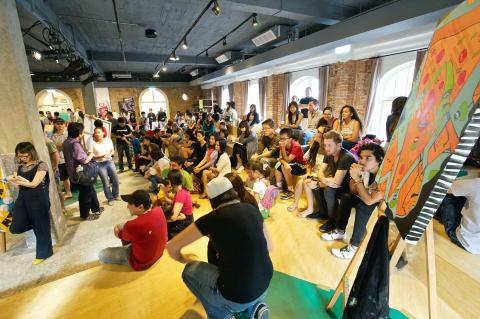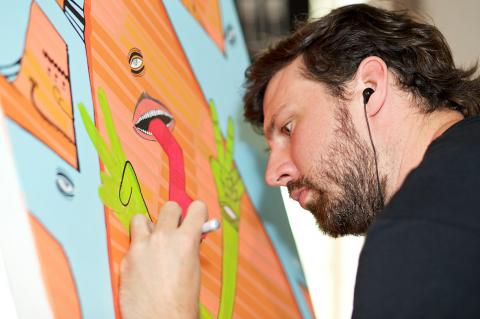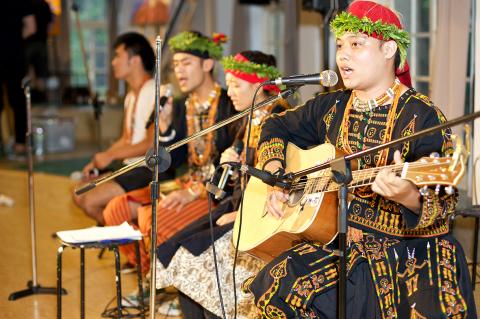Last month, contributing reporter David Frazier wrote an article (“Fighting fake culture,” April 17, page 11) about the commercialization of culture parks like Huashan 1914 Creative Park and Songshan Culture Creative Park. Nominally set up to provide space for artists to create and be inspired, they are now dominated by large organizations that have turned them into, as Frazier wrote, “cultural shopping malls.”
Fortunately, there’s been somewhat of a smaller countermovement. Nine days after Frazier’s article was published, dozens of expat and local artists gathered at Huashan for a live painting event alongside live music and a generous sale of sangrias and craft beers. Called Artists Break the Mold 3, it was hosted by the Red Room group, a Taipei-based non-profit that aims to bring together the creative community by hosting regular events.
The artwork produced that day has since been displayed on a rotating basis at Huashan and The Escape Artist, a restaurant-come-live painting venue. On Sunday, there will be a closing reception at The Escape Artist, where the artwork will be auctioned off to the Chokgyur Lingpa Foundation’s Earthquake Relief Fund to help victims of the recent Nepal earthquake.

Photo Courtesy of Red Room
FOSTERING THE CREATIVE GENE
The idea behind Artists Break the Mold originated in July 2009 when Red Room members responded to the devastation caused by Typhoon Morakot. They pulled together a group of artists and musicians for a similar live painting event named Artists Beat the Flood, and donated the proceeds to the relief effort. Last year, Red Room’s former coordinator Manav Mehta revived the idea with Artists Beat the Flood 2.
“Creation needs an audience. We are simply making that possible; the rest is magic,” says Roma Mehta, the current Red Room coordinator. The idea, she says, is to provide “a space for the creative energy in each of us to flow naturally.”

Photo Courtesy of Red Room
Mehta adds that last year’s response was particularly encouraging and that they plan to continue organizing such events on a yearly basis. What sets Artists Break the Mold apart is the level of interaction between artist and viewer — something which is hard to mimic at a typical gallery exhibition.
“It is so unlike walking into an art gallery and viewing a finished painting on a wall,” Mehta says. “It’s inspiring to observe the artist transfer his or her thoughts onto a blank canvas and watch the visual story unfold.”
Moreover, such interaction is meant to provide a much-needed dialogue and spark inspiration, thereby fending off the “fake culture” of commercialized artistic endeavors.

Photo Courtesy of Red Room
All participating artists will be at Sunday’s closing reception and viewers are encouraged to mingle and converse with them. Those who wish to paint can do so, as brushes, paints and easels will be provided. Of course, there will also be wine, sangria and snacks.
“Amateurism is celebrated,” Mehta says. “It’s important to nourish the creative gene in all of us.”
Dear readers: The Compass Taichung International Food and Music Festival in Taichung, reported in yesterday’s page 12 and originally slated to take place tomorrow and Sunday, has been canceled due to expected heavy rain. The festival has been moved to September.

Dissident artist Ai Weiwei’s (艾未未) famous return to the People’s Republic of China (PRC) has been overshadowed by the astonishing news of the latest arrests of senior military figures for “corruption,” but it is an interesting piece of news in its own right, though more for what Ai does not understand than for what he does. Ai simply lacks the reflective understanding that the loneliness and isolation he imagines are “European” are simply the joys of life as an expat. That goes both ways: “I love Taiwan!” say many still wet-behind-the-ears expats here, not realizing what they love is being an

Google unveiled an artificial intelligence tool Wednesday that its scientists said would help unravel the mysteries of the human genome — and could one day lead to new treatments for diseases. The deep learning model AlphaGenome was hailed by outside researchers as a “breakthrough” that would let scientists study and even simulate the roots of difficult-to-treat genetic diseases. While the first complete map of the human genome in 2003 “gave us the book of life, reading it remained a challenge,” Pushmeet Kohli, vice president of research at Google DeepMind, told journalists. “We have the text,” he said, which is a sequence of

Every now and then, even hardcore hikers like to sleep in, leave the heavy gear at home and just enjoy a relaxed half-day stroll in the mountains: no cold, no steep uphills, no pressure to walk a certain distance in a day. In the winter, the mild climate and lower elevations of the forests in Taiwan’s far south offer a number of easy escapes like this. A prime example is the river above Mudan Reservoir (牡丹水庫): with shallow water, gentle current, abundant wildlife and a complete lack of tourists, this walk is accessible to nearly everyone but still feels quite remote.

It’s a bold filmmaking choice to have a countdown clock on the screen for most of your movie. In the best-case scenario for a movie like Mercy, in which a Los Angeles detective has to prove his innocence to an artificial intelligence judge within said time limit, it heightens the tension. Who hasn’t gotten sweaty palms in, say, a Mission: Impossible movie when the bomb is ticking down and Tom Cruise still hasn’t cleared the building? Why not just extend it for the duration? Perhaps in a better movie it might have worked. Sadly in Mercy, it’s an ever-present reminder of just